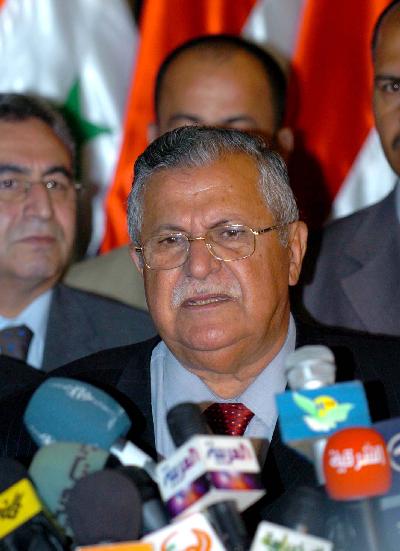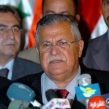
Kurdish-Arab Tensions and Irbil-Baghdad Relations
Publication: Terrorism Monitor Volume: 8 Issue: 12
By:

Iraqi Kurds possess at present not only their most powerful regional government since the creation of Iraq following World War I, but they also play prominent roles in the Iraqi central government in Baghdad, including the posts of president (Jalal al-Talabani), deputy prime minister (Barham Salih) and foreign minister (Hoshyar Zebari). This dual role in the central government and the Kurdistan Regional Government (KRG) stands in marked contrast to the situation that existed before the events of 1991 and 2003, when Kurds were treated as second class citizens or worse. The question is how long this unique Kurdish position of strength will last. Many Arabs still resent Kurdish claims to autonomy as a challenge to Arab patrimony and regard a federal state for the Iraqi Kurds within Iraq as simply a prelude to secession. Indeed, most Kurds would quickly opt for independence if they perceive the time as ripe. When will the Iraqi Arabs start trying to reduce the Kurds again? The time may have already arrived.
As the recent “Annual Threat Assessment of the US Intelligence Community” pointed out in its otherwise largely positive assessment of Iraqi security needs:
"Arab-Kurd tensions have [the] potential to derail Iraq’s generally positive security trajectory, including triggering conflict among Iraq’s ethno-sectarian groups. Many of the drivers of Arab-Kurds tensions – disputed territories, revenue sharing and control of oil resources, and integration of peshmerga forces – still need to be worked out, and miscalculations or misperceptions on either side risk an inadvertent escalation of violence. [1]"
Although their current role in Baghdad has been a hedge against renewed Arab chauvinism, it is likely that the Kurds will play a reduced role in the new Iraqi government being formed after the March 7 elections.
First, however, one must query whether the Kurdish house itself is in order to meet this impending struggle. The long conflict for ultimate power in Iraqi Kurdistan between Massoud Barzani’s Kurdistan Democratic Party (KDP) and Jalal al-Talabani’s Patriotic Union of Kurdistan (PUK) – a contest that led to a bloody civil war between the two as recently as the mid-1990s and even saw Barzani call upon Saddam Hussein for help in 1996 – was put on hold by ceding Barzani the presidency of the KRG while al-Talabani assumed the largely ceremonial presidency of Iraq. Although one might wonder what will follow once al-Talabani retires from the Iraqi presidency, the KDP-PUK compromise continues to hold as Barham Sahih from the PUK has become the new KRG prime minister despite significant PUK losses to Nawshirwan Mustafa’s Gorran (Change) Party in the KRG elections at the end of July 2009. The KDP-PUK also continued their joint electoral slate for this month’s Iraqi parliamentary elections. Nevertheless, the Gorran Party has the potential to divide the Kurds.
The Iraqi Constitution approved by a hotly contested referendum on October 15, 2005 established a federal structure for Iraq that grants significant powers to the regions. [2] The actual division of power between the Iraqi government and the KRG, however, remains in dispute. Contested powers include the ownership of natural resources and control of the revenues flowing from them, the role of the KRG peshmerga (militia) and the final status of Kirkuk and several other disputed territories such as Sinjar and Makhmur. Control of Mosul, Iraq’s third largest city, including a big Kurdish population in its eastern part, is also being contested.
Controlling the Oil Reserves
Dr. Ashti A. Hawrami, the KRG Minister for Natural Resources, addressed the issue of natural resource ownership in an interview in the KRG capital of Irbil on June 14, 2006. He argued strongly that Article 115 of the new Iraqi Constitution “states the supremacy of regional laws over federal laws, and can be invoked if no agreement is reached on the management of oil and gas resources and the distribution of proceeds.” He also argued that Article 112 of the Constitution only permits the Iraqi Government an administrative role, while the extraction process is to be supervised by elected regional authorities.
Hawrami went on to maintain that since the new Constitution was silent on undeveloped fields or any new fields, “the regions and governorates will have all the controls.” Although he stated that the KRG and the government in Baghdad would be able to cooperate, there is heated verbal conflict over the issue of natural resources (KurdishMedia.com, June 14, 2006).
Since Hawrami’s speech, several apparent compromises on a Hydrocarbons law have fallen through, leading to the suspension of oil exports from Kurdistan in October 2010. Since then the KRG’s output has slumped to 20,000 barrels a day. Nevertheless, in February 2010, Iraqi Minister of Oil Hussain al-Shahristani announced that Iraq expected to resume oil exports from the Kurdistan region “in the near future.” However, the fate of the earlier disputed deals between the KRG and foreign companies remains unclear and an impasse remains (Medya News, February 9).
The Current Situation
The present relationship between Irbil and Baghdad is “characterized by suspicion, animosity and brinkmanship” that threaten the stability of the Iraqi state (Medya News, February 9). [3] As al-Maliki’s Baghdad government grows in strength and confidence, it has naturally begun to seek to re-impose its authority over the northern Kurdish part of the state. The 2005 constitution that guaranteed real federalism and thus semi-independence for the KRG is now challenged as having been imposed during a moment of weakness. Many (but not all) Shiite and Sunni Arabs now seek to return to a more centralized state that will need to alter the constitution. [4] This offers al-Maliki a strong position as he seeks to rebuild Iraq and end the sectarian violence between Shiite and Sunni Arabs. Given the existing demographics and assets of the two sides, there is a sense that time is on Baghdad’s side. In the KRG, however, there are those who think it would be best to confront Baghdad militarily sooner rather than later, when the power equation between the two would be less favorable to the Kurds.
For the past two years, Barzani and al-Maliki have been locked in a bitter verbal struggle over the situation. During a tense meeting in Baghdad in November 2008, Barzani told al-Maliki, “you smell like a dictator” (Economist, November 27, 2008). In August 2008, these semantic fireworks nearly resulted in open hostilities over the disputed Diyala province city of Khanaqin on the de facto internal border, often referred to as the “trigger line.” Here the Kurdish peshmerga ignored an ultimatum by the Iraqi Security Forces (ISF) to withdraw within 24 hours. After some very tense brinkmanship, the two sides each withdrew some 15 miles, leaving security within Khanaqin to be handled by the police.
The two sides have come close to fighting on several subsequent occasions, usually in rural areas where military commanders are more prone to act on their own. In 2009, however, Baghdad ISF units entered the disputed but mainly Kurdish town of Altun Kupri. When residents supported by the peshmerga began to demonstrate, the Baghdad troops were told to shoot to kill. Only the presence of U.S. troops stationed nearby prevented bloodshed.
Oil-rich and strategically located Kirkuk represents the center of these Irbil-Baghdad tensions. It is a divided city beset by a highly complex territorial dispute. [5] Though Baghdad once appeared ready to hand Kirkuk to the KRG under the provisions of Article 140 of the 2005 Iraqi constitution, the contested city and province now seem the proverbial “bridge too far” for the Kurds. While the Kurds maintain that the Iraqi constitution (including Article 140) must be implemented, Baghdad has become increasingly critical of the constitution in general (and Article 140 in particular) as being part of a constitution that is now out of date.
Ironically, many Arabs fall back on the constitution by pointing to Article 142, which implements a promise to the Sunnis to review the document by allowing amendments agreed to by a parliamentary majority (Daily Star [Beirut], November 19, 2009). To buttress his position, al-Maliki has established so-called Isnad (Support) councils in Mosul, similar in scope and purpose to the earlier Sahwat (Awakening) councils in the center and south of Iraq. He also ordered the Baghdad Interior Ministry to assume direct responsibility for security in Mosul in November 2008, and transferred those units of the ISF dominated by Kurds. Earlier the Iraqi prime minister had also replaced Kurdish officers in ISF units stationed in the provinces of Niniwa, Diyala, and Salahadin.
The Future
How then will ties between the KRG and Baghdad play out? Will Iraq remain truly federal as the KRG demands or federal in name only as the Arabs recentralize the state? KRG president Massoud Barzani has warned; “We will not allow the Kurdish people’s achievements to be wrecked by the Iraqi parliament. Iraq will fall apart if the Iraqi constitution is violated.” [6] So far, the KRG leadership has shown an astuteness and good judgment that argues against any such rash action. Violence and even civil war, if they come, are more likely to develop inadvertently.
A shaky Iraqi political order currently exists in which Sunnis have only recently begun to participate. Extremist sectarian violence has been constrained and effective central government instituted. Within this order, the Kurds have been major participants. They have instituted their own successful government, the KRG, protected by some 75,000 peshmerga, with increasing acceptance from Turkey and a tenuous U.S. guarantee of protection, which, however, will become increasingly problematic as U.S. forces begin to withdraw. As this occurs, violence between Irbil and Baghdad could result.
If Sunnis continue to participate in Iraq’s new order, they may replace the Kurds in Iraq’s governing coalition with the Shiites. It is likely, for example, that while the next prime minister of Iraq will again be a Shiite, the Kurds may lose their hold on the Iraqi presidency to the Sunnis. Although this might decrease Iraq’s sectarian divisions, it could stimulate Kurdish marginalization from the Iraqi state and thus make ethnic violence between the Kurds and Arabs more probable. The continuing uncertainty over the future of Iraq’s rich oil reserves would certainly fuel any such struggle.
Others, however, like Zalmay Khalilzad, the former U.S. ambassador to Iraq, argue that despite these signs of Arab impatience with the Kurdish gains and continuing demands, there is still a general consensus to accept the Kurdish federal state given the realities of post-Saddam Iraq. [7] What is required then is a wisdom and maturity that will lead both sides to compromise their extreme visions in order to implement a federalism satisfactory to both.
Notes:
1. Dennis C. Blair (Director of National Intelligence), “Annual Threat Assessment of the US Intelligence Community for the Senate Select Committee on Intelligence,” February 2, 2010, p. 23.
2. For background, see Brendan O’Leary et al., eds., The Future of Kurdistan in Iraq (Philadelphia: University of Pennsylvania Press, 2005).
3. For a lucid analysis, see Gareth Stansfield and Liam Anderson, “Kurds in Iraq; The Struggle between Baghdad and Erbil,” Middle East Policy 16 (Spring 2009), pp. 134-45
4. The Shiite Islamic Supreme Council of Iraq (ISCI) agrees with the Kurds about maintaining real federalism in Iraq. Although influential in Basra, the ISCI lost considerable electoral support in the local Iraqi elections held in January 2009.
5. Liam Anderson and Gareth Stansfield, Crisis in Kirkuk: Ethnopolitics of Conflict and Compromise (Philadelphia: University of Pennsylvania Press, 2009), p. 9.
6. “President Barzani: Iraq Will Fall Apart If Constitution Violated,” KRG Press Release, August 7, 2008; https://www.krg.org/articles/<wbr></wbr>detail.aspsmap=02010100&Ingnr=<wbr></wbr>12&anr=25113&rnr=223.
7. Zalmay Khalilzad, remarks made at the Jamestown Foundation conference: “The Iraqi Elections & the Changing Politico-Security Environment in Iraq,” Carnegie Endowment for International Peace, Washington, D.C., March 4, 2010.




